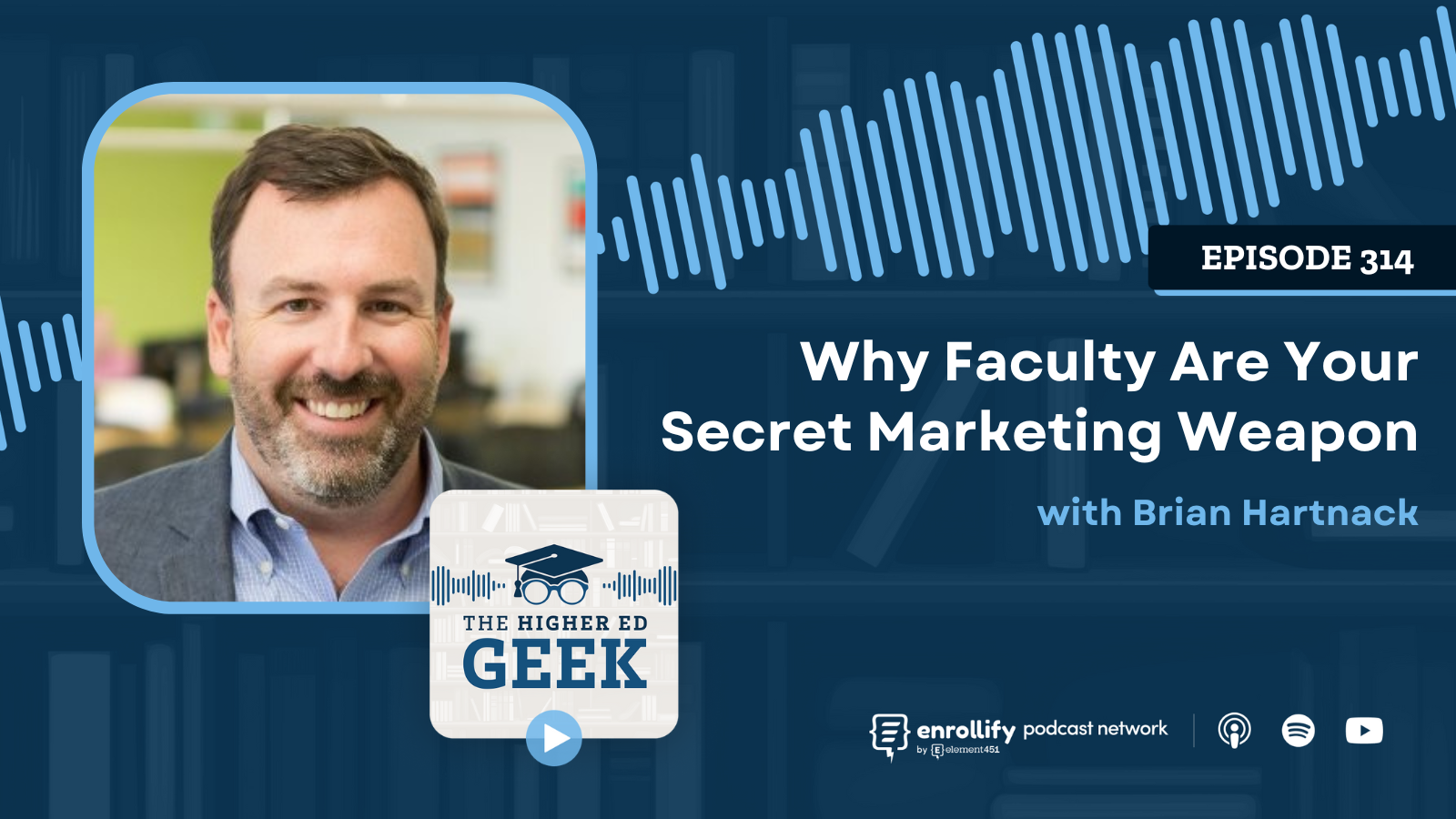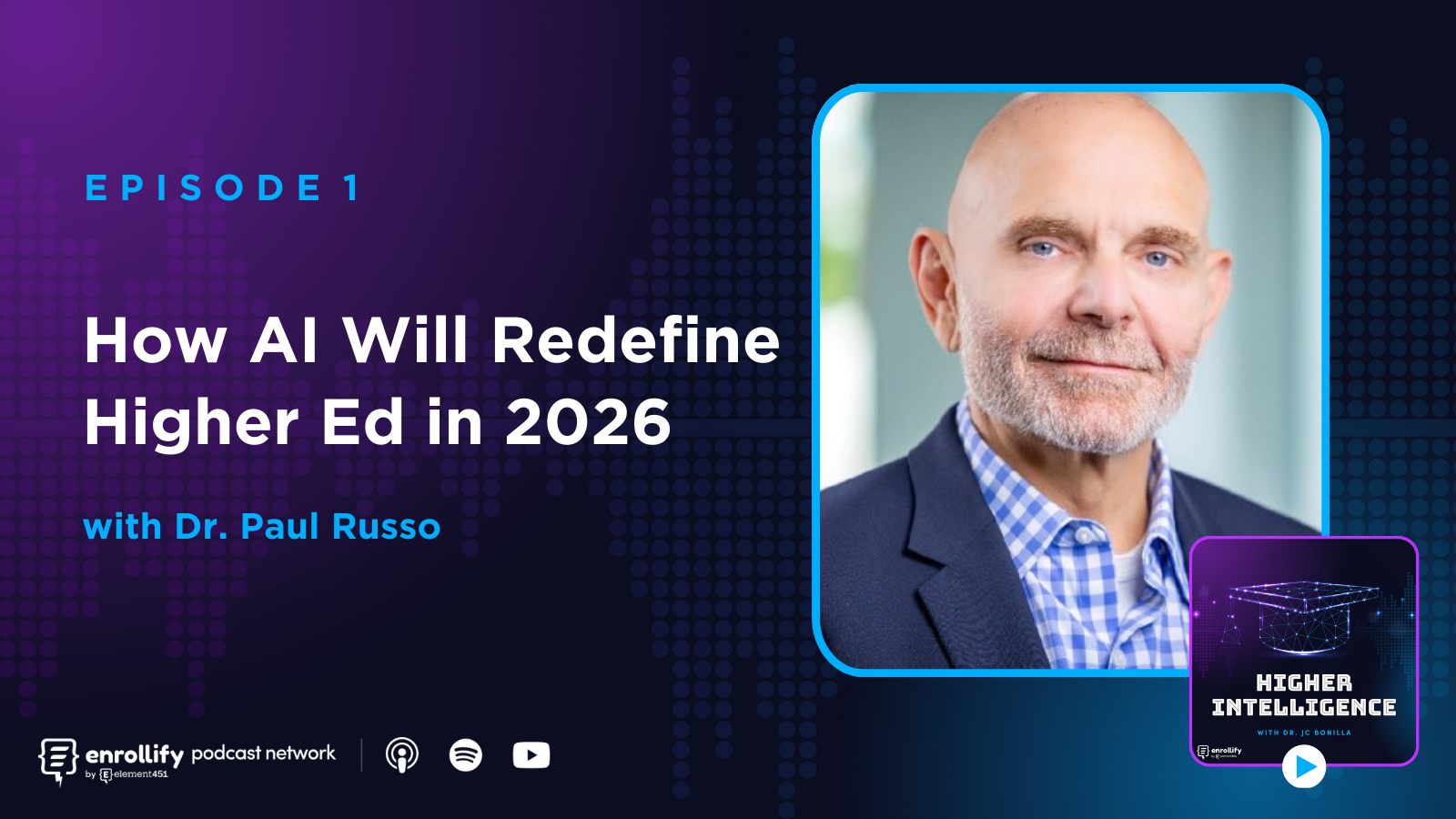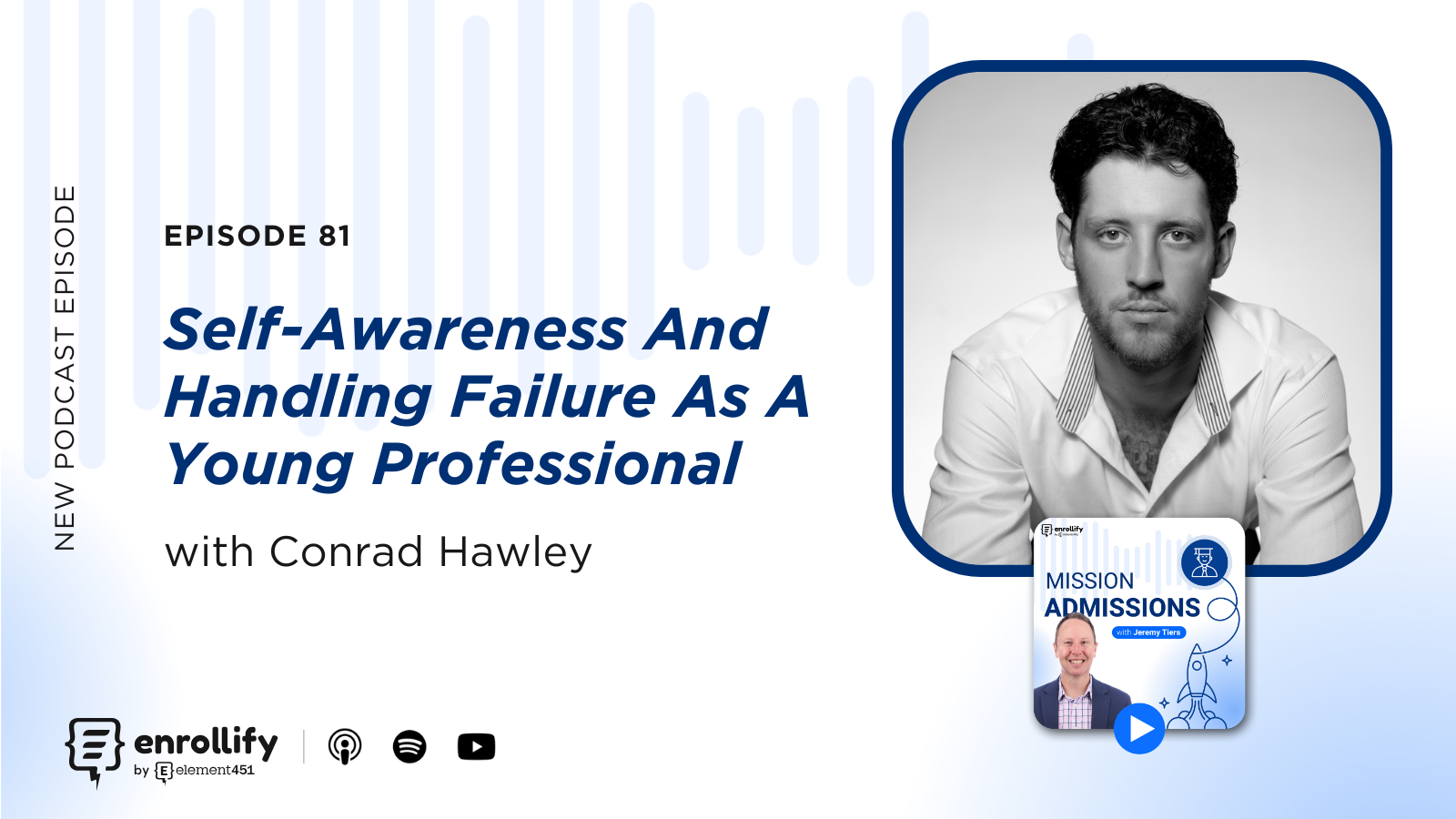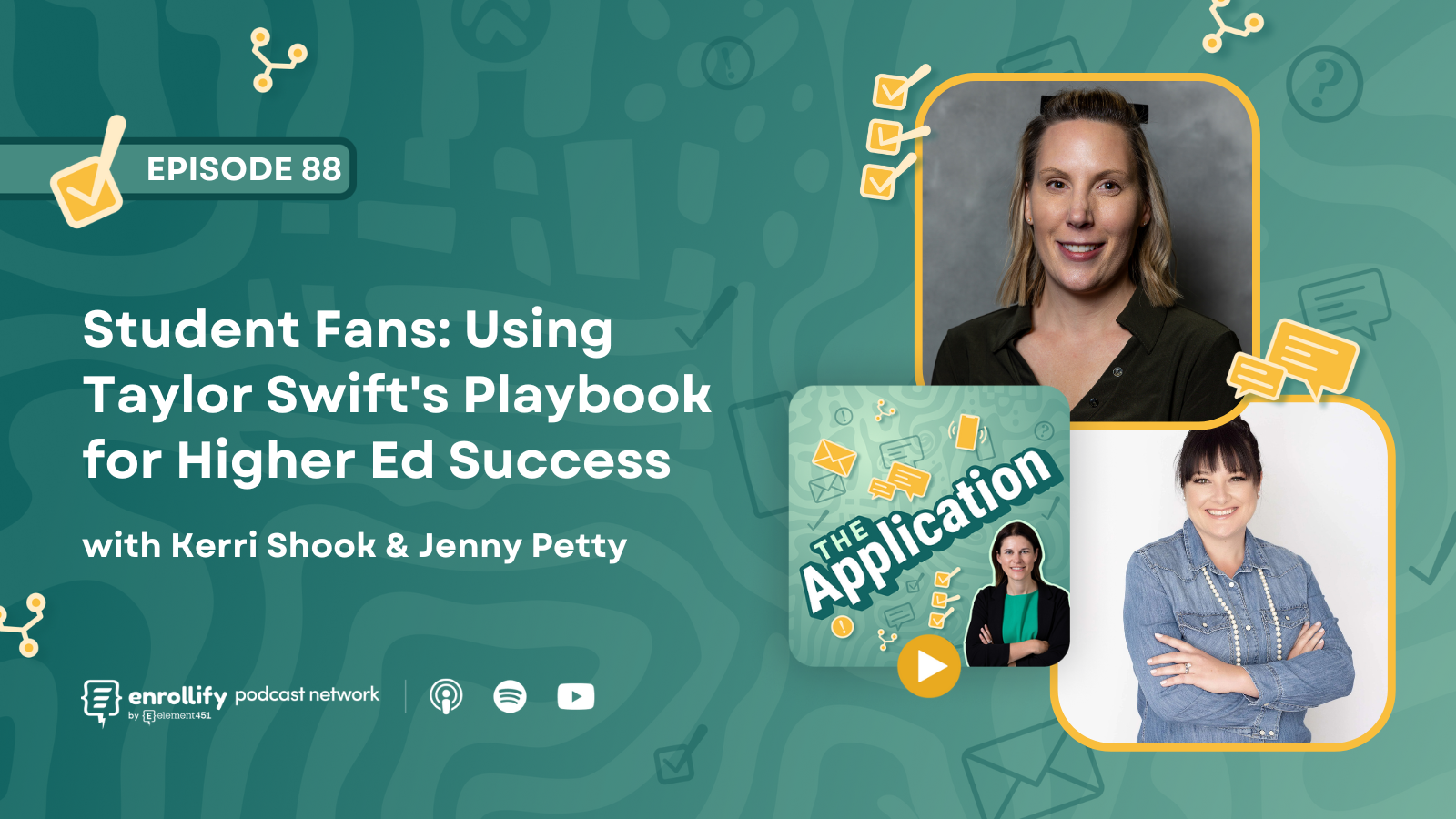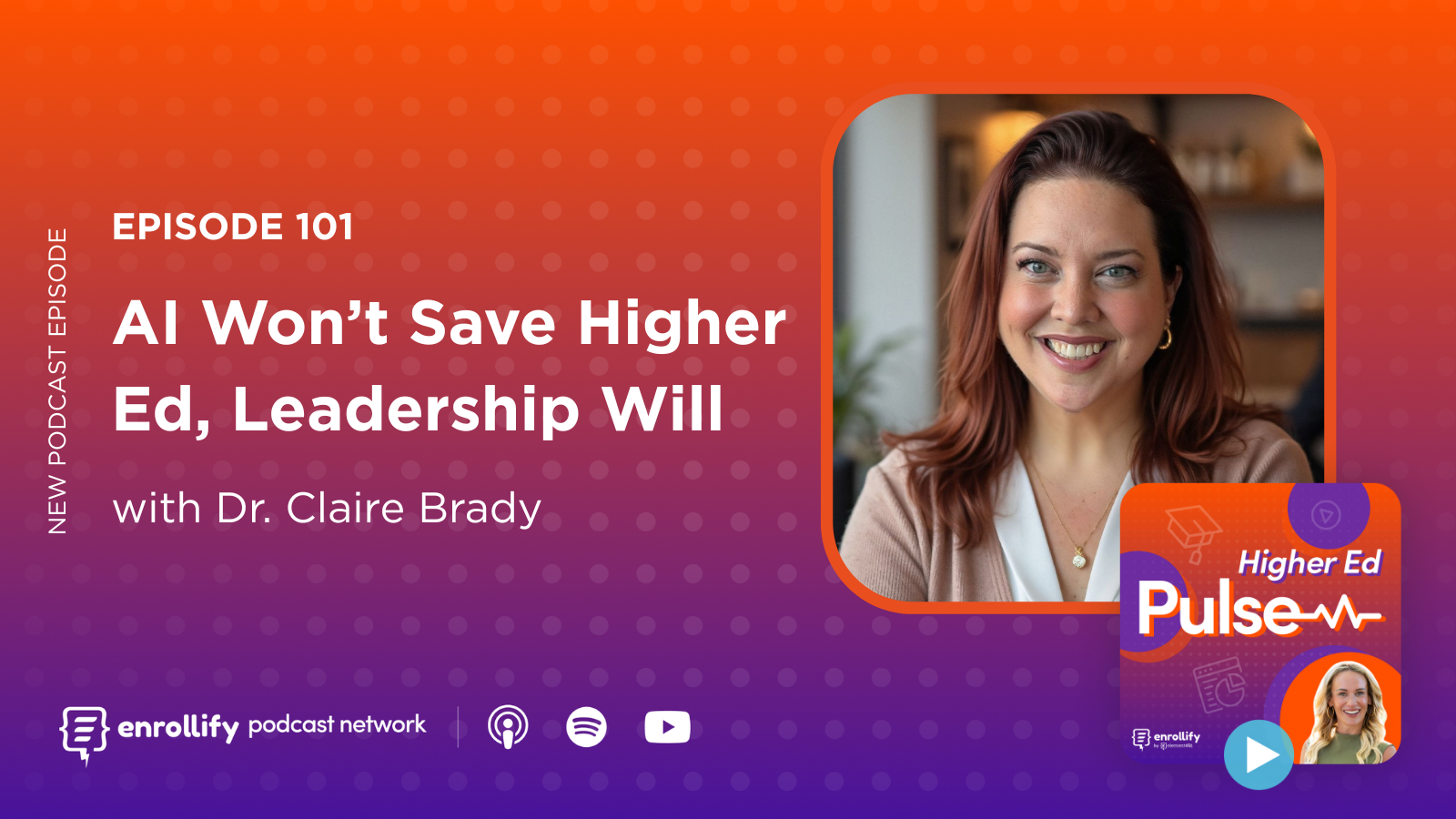About the Episode
Got a story to tell? An innovative idea to share? Fill out our guest nomination form and let's chat!
About The Episode:
In this episode, Spenser Smith of QS Quacquarelli Symonds joins Brian to explore how higher education institutions can adopt AI while staying grounded in ethics and purpose. With new tools emerging almost daily, Spenser explains why it is essential to pause, set clear goals, and stay focused on the real purpose behind adopting new technology. He shares how AI can support enrollment teams by streamlining research, enabling proactive outreach, and supplementing human expertise without replacing the critical personal connections that define higher education.
Join us as we discuss:
- [7:24] Why higher ed pros need to adopt a student mindset with AI
- [13:55] Why AI agents won’t replace empathy, compassion, or context
- [19:43] How to use AI to proactively engage prospects at just the right time
To hear this interview and many more like it, subscribe on Apple Podcasts, Spotify, or our website, or search for AI for U with Brian Piper in your favorite podcast player.
How is Spenser Smith integrating AI into his day-to-day work at QS?
Spenser's use of AI is a blueprint for practical, high-impact integration. At QS, he’s created a custom AI engine that curates a personalized, daily intelligence briefing—surfacing news and institutional updates relevant to the universities he partners with. This real-time, localized feed helps him understand his partners' current priorities and pain points, allowing for more tailored and meaningful client conversations. By automating this type of daily scan, Spenser frees up time for strategic work and enhances his value to institutional stakeholders.
What sparked Spenser’s interest in AI and how did he get started?
Like many in higher ed, Spenser’s AI journey started with curiosity and experimentation—initially asking ChatGPT simple questions like what to cook with random pantry ingredients. But the breakthrough came when he realized AI could support his professional skill set. At a previous institution, he built a custom Slate assistant that generated HTML email frameworks and landing page templates, dramatically speeding up collaboration with IT teams. He then evolved that tool into a personalized training engine, using uploaded screenshots and custom prompts to onboard new team members. This problem-solving mindset highlights how AI can bridge skill gaps and scale expertise.
What are the biggest barriers to AI adoption in higher education?
Spenser believes higher ed’s biggest challenge isn’t technological—it’s institutional culture. AI integration requires a shift in mindset. Many leaders still view it as a threat rather than an enhancement. Spenser argues that AI won’t replace higher ed professionals, but those who use AI effectively might. He also warns against fragmented adoption, likening the current state of AI in higher ed to the Wild West—unregulated, decentralized, and sometimes misaligned with institutional goals. He advocates for a more unified and ethical approach, especially in enrollment management, where the stakes around bias, transparency, and fairness are high.
What advice does Spenser have for higher ed professionals getting started with AI?
Start by defining your why. Whether you're optimizing student communications or analyzing engagement data, clarity of purpose is everything. Spenser urges institutions to map their goals before diving into tools—just as you’d create blueprints before building a house. Without this foundation, AI risks becoming noise instead of strategy. He also recommends treating AI education like a literature review: overwhelming at first, but powerful once you commit to learning. For those overwhelmed by the learning curve, he suggests starting small with tasks like summarizing research or creating frameworks for existing workflows.
Where is AI heading, and what does that mean for enrollment teams?
The future of AI in higher ed lies in predictive analytics and proactive engagement. Spenser notes that some platforms are now projecting student enrollment patterns as far as 2090. While that might seem extreme, he emphasizes that the next frontier will be institutions using AI to anticipate student behavior in near real-time—allowing for more timely outreach, personalized messaging, and data-backed decisions. In one example, Spenser used timestamp data from his Slate CRM to train an AI model that identified optimal windows for contacting prospective students. The results? More responsive engagement and more meaningful student interactions.
How do AI agents fit into the picture—and are we there yet?
Spenser views current tools like custom GPTs as early-stage agents: they can complete discrete tasks but still require human oversight. True AI agents—those capable of managing complex, multi-step processes—are on the horizon, but he cautions against assuming they’ll replace key roles in higher ed. Chatbots and agents can handle FAQs or off-hour responses, but the real magic of higher ed lies in human empathy, trust, and personal support. AI should enhance—not replace—those core experiences. In short, these tools should supplement, not supplant.
What are Spenser’s favorite AI use cases?
For his PhD research, Spenser built a custom engine that summarizes academic abstracts and links directly to peer-reviewed articles—saving him hours of manual research time. On the professional side, he leveraged AI to create proactive outreach dashboards in Slate, identifying high-interest prospects in real time and enabling his team to act fast. These dashboards used a blend of engagement data (IP activity, email clicks, pageviews) to flag when a student was “raising their hand,” prompting personalized and timely follow-ups without resorting to creepy or invasive tactics.
Connect With Our Host:
Brian Piper
https://www.linkedin.com/in/brianwpiper/
About The Enrollify Podcast Network:
AI for U is a part of the Enrollify Podcast Network. If you like this podcast, chances are you’ll like other Enrollify shows too!
Some of our favorites include Generation AI and Mastering the Next.
Enrollify is produced by Element451 — the next-generation AI student engagement platform helping institutions create meaningful and personalized interactions with students. Learn more at element451.com.
Attend the 2025 Engage Summit!
The Engage Summit is the premier conference for forward-thinking leaders and practitioners dedicated to exploring the transformative power of AI in education.
Explore the strategies and tools to step into the next generation of student engagement, supercharged by AI. You'll leave ready to deliver the most personalized digital engagement experience every step of the way.
👉🏻 Register now to secure your spot in Charlotte, NC, on June 24-25, 2025!







.avif)

